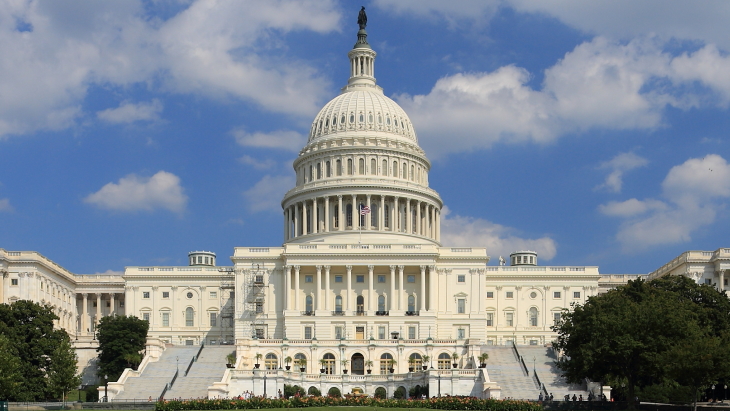
The US government omnibus spending bill includes several proposals for controversial copyright-based laws, including the felony streaming proposal.
Protocol reports the US omnibus spending bill also includes three controversial copyright-based laws- the CASE Act, the Trademark Modernization Act and a felony streaming proposal. The omnibus bill combines multiple proposals that affect the spending of the US government in the coming year, and must be passed due to the risk of a government shutdown.
While originally intending to be finalized by December 11th, that deadline was extended to December 18th. Major issues in the bill being discussed include the defense budget, President Trump’s border wall, and COVID-19 related funds. A common criticism of the omnibus is controversial laws being included in a “must pass” bill.
The CASE Act (as we previously reported) also known as the Copyright Alternative in Small-Claims Enforcement Act of 2019 would create a small claims court for copyright infringement. The bill has been criticized by some, fearing it will result in prosecution of people simply creating or sharing memes, creating parodies, reviews, and other forms of transformative works.
Democratic Senator Ron Wyden also told Protocol his concerns over the Act being abused by copyright trolls. “Passing the CASE Act without reforms will unleash a host of lawsuits against innocent internet users and restrict their ability to defend themselves against trolls. […] It is tremendously disappointing that powerful lobbying groups may be close to attaching this flawed legislation to a must-pass spending bill without commonsense changes to protect Americans from predatory copyright trolls.”
Meanwhile, the Trademark Modernization Act would (in IPWatchDog’s words) “restore the rebuttable presumption of irreparable harm when a trademark violation has been proven.” While intended to prevent fraudulent trademark claims and filings from China, some fear it would benefit those who trademark without intending to use it, only to spring it upon those who unwittingly violate it later (trademark trolls).
The final is the felony streaming proposal. As the name implies, it would grant the Department of Justice permission to charge those who stream copywritten content with a felony; typically reserved for murder, rape, grand theft, kidnapping, and tax evasion.
Those guilty of a felony in the US lose the right to vote, to certain licences, cannot possess a gun, and are ineligible for government assistance or welfare. Due to the nature of the crime could include listening to music uploaded to YouTube, many are concerned the punishment far outweighs the crime.
Protocol reports that 18 organizations from tech trade, advocacy groups, and library associations- including the Internet Association, the Electronic Frontier Foundation, and American Library Association- have objected to the proposed laws in a joint letter.
“We respect Congress’s intent to improve our intellectual property system and protect the rights of creators and entrepreneurs. However, certain aspects of this package of bills will have negative impacts on small- and medium-sized businesses, creators, libraries and their patrons, students, teachers, educational institutions, religious institutions, fan communities, internet users, and free expression.
[…] All signatories have serious concerns with at least some aspect of the bills slated to be included in their current state, and we stand ready to work with Congress to avoid their unintended consequences.”
Copyright has often been a subject discussed online, especially thanks to the Digital Millennium Copyrighr Act or DMCA. While sharing gameplay footage for review or entertainment (such as let’s plays or streaming) has usually been given a pass, there is always fear that something will trigger an automated bot to bring down a copyright strike on those who stream or create content as a job.
On November 11th of this year, Twitch recommended users not play copywritten music during their streams, after a large surge of DMCA claims and purging thousands of videos without warning. They also recommended users should review their VODs of older streams and Clips, and delete any that contain such music. Many felt this response was insulting.
This was only made worse when Twitch asked users to delete VODs and Clips they made from the Fortnite Nexus War event, to avoid DMCA strikes due to the licensed music used- despite express permission from Epic Games.
The European Articles 11 and 13 [1, 2, 3] was passed in 2019, and will take two years to come into effect. While Article 11 enforces a tax on posting hyperlinks online, Article 13 states that websites are to be held responsible when users upload copywritten content. Some fear this goes far beyond halting memes, but information and internet freedom in general.
Another recent case includes Etika-themed Joy-Con shells being sold for charity, only for Nintendo (already known for halting fan-games) to issue a cease & desist order. Nintendo of America also recently issued a cease and desist order to Super Smash Bros. Melee tournament The Big House, due to them using an emulator with netplay to play Super Smash Bros. Melee, honoring the COVID-19 quarantine orders.
Older examples include how VTuber group Hololive was slammed by multiple DMCA strikes (as the performers frequently stream games and sing music), while the Internet Archive was sued by major publishers for lifting the limit on how many digital books it “lent out,” as part of the “National Emergency Library” initiative.
This is Niche Gamer Tech. In this column, we regularly cover tech and things related to the tech industry. Please leave feedback and let us know if there’s tech or a story you want us to cover!
Image: Wikipedia